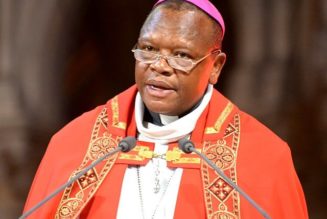ROME – With the sudden death of Giuseppe Profiti on Aug. 10 from a heart attack, at the relatively young age of 62, not only has Italy lost one of its most veteran leaders in public health administration, but the Catholic Church has lost a figure who became an unwitting metaphor for the ambiguities of Vatican justice in the Pope Francis era.
Born in Calabria in southern Italy, Profiti graduated in public administration from the University of Genoa in 1985 and began a long career as a manager of hospitals and public health systems, mostly in the Liguria region in which Genoa is located, earning a reputation for efficient leadership and sound financial management. In a tribute to his even-handedness, he was able to serve regional governments of both left and right.
In Genoa, he also came to know the city’s then-archbishop, Tarcisio Bertone, who went on to become the Vatican’s Secretary of State under Pope Benedict XVI. It was Bertone who called Profiti to Rome in 2008 to run the papally sponsored pediatric hospital Bambino Gesù, where he achieved impressive results, presiding over growth in the number of surgical interventions and therapeutic programs, an expansion in the hospital’s international partnerships, and several years of balanced budgets.
His performance was considered sufficiently compelling that when his first term was up in 2013, Pope Francis asked him to stay on for another five years.
Profiti didn’t make it to the end, however, because in 2016 the Vatican announced he and the treasurer of the Bambino Gesù, Italian layman Massimo Spina, were under investigation on charges of embezzlement and misappropriation of funds.
A year later, Profiti would be found guilty of abuse of office and sentenced to one year of detention, although the jail term was suspended on the condition that he not commit another crime. Spina was acquitted on the grounds that he lacked the authority to make expenditures on his own.
The case pivoted on the fact that Profiti had diverted roughly half a million dollars of hospital funds to finance the renovation of Bertone’s new Vatican apartment, which he had been assigned after Francis removed him as Secretary of State in October 2013.
That 4,000-square-foot apartment, located in the Palazzo San Carlo adjacent to the Casa Santa Marta where Pope Francis resides, features a large terrace and a breathtaking view of the dome of St. Peter’s Basilica, though it was reportedly in a state of disrepair when Bertone moved in – among other things, the roof leaked and had to be replaced.
To do the work, Bertone bypassed the Vatican’s usual competitive bidding system and hired a company owned by a longtime friend from Genoa, Gianantonio Bandera, saying he’d pay for it using private funds. He then turned to Profiti to help cover the costs, using money from the foundation that governs the Bambino Gesù, on the grounds that the foundation would then be able to use the apartment to host fundraising events.
When news of the deal broke in 2017, it came at a time when Pope Francis was trying to reform the Vatican’s financial operations, and so a criminal trial was launched. However, it did not escape anyone’s attention that while Profiti and Spina were charged with crimes, Bertone not only wasn’t indicted, he wasn’t even called to testify, despite the fact that he was clearly the principal beneficiary of the transaction.
Throughout the trial, Profiti steadfastly defended the outlay of roughly $460,000 on the grounds that in years to come, fundraising events in the space easily would have recovered that amount and more. The fact that gala black-tie fundraisers with deep-pocketed donors suddenly went out of fashion in the Pope Francis era, he suggested, wasn’t his fault. Notably, Vatican prosecutors never disputed the investment motive for the expenditures.
Moreover, there was never any evidence that Profiti or Spina themselves profited from the deal. Indeed, the only figure to reap any personal benefit was Bertone, who lives in the remodeled apartment to this day. Bertone eventually would provide $165,000 out of his own pocket to help cover the hospital’s losses, which was a de facto admission of responsibility.
One telling point is this: Usually, if an official is caught with his hands in the cookie jar and convicted of a crime, the resulting stain on one’s reputation has a chilling effect on professional prospects. Profiti, however, was immediately hired as the president of a major cardiac care center in Italy after the Vatican affair ended, as well as a company specializing in medical patents.
At the time of his death, Profiti was serving as the director of the public health system in his native Calabria, after having turned down an offer to return to Liguria in a similar capacity. Roberto Occhiuto, president of the Calabria region, called Profiti “a manager of extraordinary quality and a professional of absolute value,” declaring a day of mourning for his loss.
Then and now, most observers felt that Profiti basically was a scapegoat.
Pope Francis’s team wanted to demonstrate a break from the past by holding someone accountable for poor money management, but for political reasons they weren’t willing to go after Bertone – in part for the simple reason that he was a former Secretary of State, in part because he was close to Pope emeritus Benedict XVI and prosecuting him would have risked aggravating those tensions, and in part too, perhaps, because Bertone knew where the bodies were buried and might have been inclined to take others down with him.
Instead, the system served up Profiti, despite a near-total lack of evidence that he ever intended to misappropriate funds and the undisputed fact that he was acting at the behest of a senior Vatican cardinal.
As one Italian news outlet put it in an obituary of Profiti this week, he was “massacred in the media … for simply following the instructions of the Cardinal Secretary of State.” The piece was published, by the way, under the headline, “Goodbye to Giuseppe Profiti, a great health care manager who had the misfortune to work for the Holy See.”
If all that sounds familiar, it should.
The Vatican currently is nearing the end of another high-profile trial for financial crime, and once again there are impressions that the defendants in the case, including Italian Cardinal Angelo Becciu, the pope’s former chief of staff, have been carefully selected to insulate other figures from culpability, including Bertone’s successor as Secretary of State, Italian Cardinal Pietro Parolin, and his deputy, Venezuelan Archbishop Edgar Peña Parra, despite the fact that both men signed off on the disputed transactions at every stage.
For the judges who will have to render a verdict, which is expected in December, the sudden death of another man convicted of financial crime by a Vatican court is perhaps also an invitation to reflection – because what Profiti’s story arguably illustrates best is that the last word in the case won’t belong to the Vatican tribunal, but to history, and that’s a judge which doesn’t offer political discounts to anybody.
Profiti’s funeral will take place tomorrow afternoon at the Basilica of the Immaculate Conception in his hometown of Catanzaro in Calabria.
Follow John L. Allen Jr. on Twitter: @JohnLAllenJr








![A writer, raised by atheist parents, reflects on the brilliance of ‘A Charlie Brown Christmas’ [you may hit a paywall here, but it’s well worth reading]…](https://salvationprosperity.net/wp-content/uploads/2021/12/a-writer-raised-by-atheist-parents-reflects-on-the-brilliance-of-a-charlie-brown-christmas-you-may-hit-a-paywall-here-but-its-well-worth-reading-327x219.png)